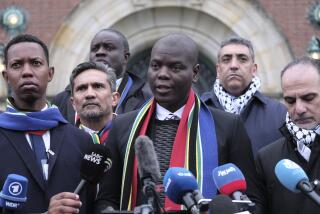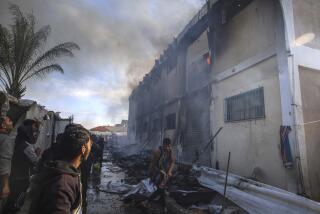Justice in the Killing Fields
- Share via
Mass murder trials, with their litanies of death, are not for the squeamish. But they are often the only way to clear the political and psychological ghosts that can haunt a nation’s killing fields for generations.
This week, in grim opening statements, United Nations prosecutors are recounting how soldiers in the former Yugoslavia slaughtered innocents, burned victims to death and picked off children with high-powered rifles. The objective is to prove that former Yugoslav President Slobodan Milosevic was responsible.
This is the most important tribunal since World War II victors brought justice to the leaders of Germany and Japan. In contrast, the U.N. seems ready to stop trying to prosecute the Khmer Rouge murderers in Cambodia. The world should not let that happen.
The Hague proceedings, at which authorities will take an estimated two years to try Milosevic for alleged crimes against humanity in Croatia and Kosovo, and genocide in Bosnia-Herzegovina, demonstrate the international community’s resolve. Hundreds of thousands of Muslims, Bosnians and Croats were killed during the wars in what prosecutors charge was Milosevic’s attempt to create a Greater Serbia.
Serbia remains the dominant republic in Yugoslavia, and Kosovo is its main province. Many Serbians resent The Hague tribunal and contend that they are on trial along with their former leader. Hague prosecutor Carla Del Ponte insists they are not. She is correct. But Serbians do need to be confronted with the facts about how Milosevic operated. This will shed light on the tacit complicity of Serbian civilians in murders committed by troops fighting in their name. Although painful, bringing this into the open will help build a stronger society, as happened in Germany.
Likewise, seeing Khmer Rouge torturers brought to justice would help fix responsibility for the nearly 2 million Cambodians whom Pol Pot and his underlings butchered in the 1970s, while attempting to create an agricultural utopia. Cambodians have largely refused to revisit the years of death, though many in Phnom Penh can point to men and women on the street who did the Khmer Rouge’s bidding. Pol Pot died in 1998, but other top Khmer Rouge leaders survive, including former head of state Khieu Samphan.
Meanwhile, the U.N. effort to establish a special tribunal to try these former leaders has lasted nearly as long as Pol Pot’s reign of terror. Cambodian leader Hun Sen and his cohorts have resisted U.N. efforts to make sure that tribunal judges are competent, fair and free from political influence. The United States, France and other countries--most of which turned away from the Cambodian genocide while it was occurring--have urged the United Nations to continue negotiations with the Phnom Penh government.
Cambodia’s leaders need to realize that a trial without U.N. involvement would be seen as a whitewash. They, like the Serbians, need to understand that international assistance to build schools and clear mines will never lead to real progress so long as the past remains unexamined--or, worse, mass murderers stroll the streets.
More to Read
Sign up for Essential California
The most important California stories and recommendations in your inbox every morning.
You may occasionally receive promotional content from the Los Angeles Times.













